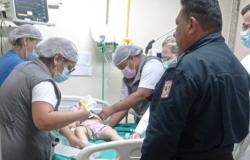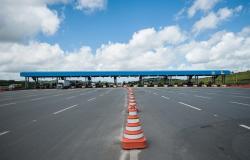The “Sementes do Taquari” project, which will reforest a total area of 6 thousand hectares of degraded soil in the Nascentes do Rio Taquari State Park, in the region between Costa Rica and Alcinópolis, advances with actions that recover the soil and the planting of seedlings natives.
The project is expected to last six years and guarantee the planting of up to 2 million trees, including 270,000 seedlings this year. It is considered the largest environmental recovery in a conservation unit in Brazil, carried out by Imasul and has support from institutions and private companies
To check the progress of the project, the director-president of Imasul (Environmental Institute of Mato Grosso do Sul), André Borges, visited one of the park’s three headquarters on Thursday (28), in the former Fazenda Continental. He was accompanied by the head of the park, environmental inspector Martha Gilka.
The area visited was acquired by the State Government in March 2023, totaling 2,765 hectares that belonged to the Continental Farm within the Nascentes do Rio Taquari State Park. “This acquisition was very important for our work, as the area is home to the sources of two tributary streams of the Taquari River, Garimpinho and Garimpeiro. It also contains a group of 39 gullies that dump tons of sediment into the river”, highlighted Martha.
With the acquisition of the area, the cattle were removed from the property. From then on, several surveys were carried out in the area to begin restoration actions. Martha recalls that in July last year, soil conservation services were carried out on 70 hectares of wide-base terracing and containment boxes, aiming to reduce soil loss and stabilize slopes.
The planting of native species, according to the head of the park, began in January. Around 51 species from the cerrado were used, such as ipê, balsamo, angico, aroeira, 20% of which are fruit plants to feed wild animals, including baru, pequi, jenipapo, Jatobá. They also inspected areas where contour lines were made, seeds were planted and numerous native species were planted. “These are areas that were degraded and are now in full recovery”, he celebrated.
Imasul’s CEO, André Borges, highlighted that the Park covers 30 thousand hectares, and that the State’s role is to protect this area and develop recovery actions. “Our monitoring shows that the program has already produced excellent results. In just seven months we have already reduced the volume of sediment in the rivers four times, we have had an increase in the presence of fish in the springs. All of these are bioindicators of environmental quality”, he pointed out.
Borges emphasizes that revegetation holds the force of water and rain as the land is covered by vegetation. “All of this, the contour lines, the terraces, make this water lose its strength, which is the biggest problem with erosion. We also have monitoring that detected the return of wild animals,” he emphasized.
Largest in Brazil
The “Sementes do Taquari” Project has the goal of restoring approximately 6 thousand hectares attached to the Nascentes do Rio Taquari State Park – with a total area of 30,618 hectares -, in the northern region of Mato Grosso do Sul – between the municipalities of Alcinópolis and Costa Rich. The objective is to plant more than 270 thousand seedlings, all native.
The gullies that affect approximately 40 hectares are being recovered. Field teams plant seeds in gullies to stem sediment loss.
The next stage consists of planting the seedlings, which is done by the NGO (non-governmental organization) Oreades, supported by the companies Cargil, ATVOS and Adecoagro. The head of the park, Martha Gilka, recalled that each hectare has received around 1,200 seedlings. “Our goal is to reach 260 hectares cultivated with seedlings by the end of the year”, she recalled.
Secretary Jaime Verruck, from Semadesc (Secretariat of Environment, Development, Science, Technology and Innovation), highlighted the importance of the initiative that shows the State Government’s effort to recover the Taquari River through interventions at its sources, preventing sediments are carried to the river bed and cause silting in the section where it reaches the Pantanal plain. “This is the largest environmental recovery project in a conservation unit in Brazil, an initiative that came from our technical team and is aligned with Prosolo”, stated Verruck.
Another important point recalled by the secretary is that the project could represent a new stage in the State’s goal of becoming Carbon Neutral in 2030. “Our objective, in addition to recovering the soil and preventing the silting of rivers, is to work with Carbon credits. These regions have enormous potential to generate carbon credits as well. Our objective is the environmental issue but also to create other alternatives for generating income with sustainability”, he concluded.






